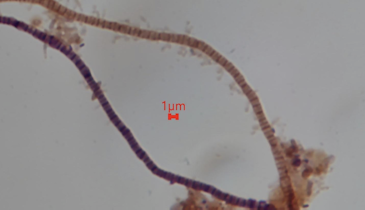A Nebraska treatment plant superintendent partners with the local university extension agriculture educator to improve a biosolids land application program. One knows wastewater, the other knows farming and farmers. Together, the build high demand for Class B dewatered biosolids and a Class A composted product for corn and soybean growers.
Transcript
Doug Day: This is Doug Day for Treatment Plant Operator Magazine, and welcome to our podcast. We're talking about biosolids today with Keith Kontor, plant superintendent for the Fremont, Nebraska wastewater treatment plant, and Dave Varner, the Dodge County Extension educator. These two have designed a very successful land application program that is saving the city about $200,000 a year, and benefits farmers, who collectively are saving about $75,000 a year in their cost of fertilizer. Let's start with Keith. It sounds like a real team effort there.
Keith Kontor: This got started about 10 years ago here in Fremont, but prior to that the community that I worked for, I worked with the county Extension educator down there doing a similar program. So then when I moved up to Fremont and took over the position here, I approached Dodge County Extension educator Dave Varner and asked him if they would be a partner in our program. The big factor there is due to the knowledge and relationship that they have with the farmers.
Dave Varner: The UW-Extension is always looking for fruitful partnerships like the one we've had with the City of Fremont over the last decade. We put a lot of stock in research-based information and that's really what we're about, is doing research in farmers' fields, in unison with the growers, so we work on on-farm research together. And in this case we had a great partner with the City of Fremont, a great product that we were just, you know, Dave Ewing, introducing to local growers. And it was interesting, the first year of this program, we had to look very hard to find just a couple producers who would work with us to try this product. A lot of skepticism in the area at the time, because quite frankly, a lot of research had not been done with biosolids in the Eastern Nebraska region. And then today, of course, as you know, the rest of the story, we have tremendous demand, we have over the last 12 years or so, so I think we have found that our recipe for success with the partnership, the on-farm research, and of course having a quality product has really led to great results.
Doug Day: Perception is really important when it comes to land-spreading biosolids. What have you done to get out accurate information and build support of the neighbors of the farms where you are spreading your biosolids?
Dave Varner: This is a very transparent program in Fremont and Dodge County because every field that is put up as a candidate for biosolids application is run through a conditional use permit process with the county planning commission, so we contact all the neighbors who own land or live within about a quarter-mile of the field's location where we are proposing to spread on. And we share information with those folks about what the product is, how we're going to spread it, pre- and the post-testing, and the great historical results we've had with the product. And we also let them know that going on this year, we've had about twelve years of success with this program without a single public complaint. Once the product is out on the field, neighbors have noticed that some of the issues they were concerned about going into the process did not come to pass, and they've been very pleased with how the process has worked.
Keith Kontor: Yeah, and Doug, and the perception is a real issue. You kind of know the perception of biosolids is not very good, so that's one thing that Dave has done real well is educating the public on what biosolids are and how they can be used beneficially.
Doug Day: You have to also educate farmers and apparently have been successful in that, even when you started charging for what used to be free, you didn't lose a single
Keith Kontor: The biggest thing is don't be afraid to ask for help if you need help. 503 regs are EPA regs that each of the plants have to follow to apply biosolids at an agronomic rate so there is no chance of run-off or anything like that. Wastewater plant operators aren't agronomous and don't have a lot of great relationships with farmers as a county extension educator does. So, again don't be afraid to ask for help. They're there, they're willing to do it. It has been just a great successful partnership with us.
Dave Varner: The other thing the City of Fremont has done that I would like to add is, they haven't just put out a minimal quality product, what they are required to do according to the regs. They went to the extra step to meet some of the interests of the growers. For example, they compost some of the material which gives us a different product for some of the growers in certain situations to use -- a product that sometimes requires screening to pull some of the garbage out of it so it doesn't end up in the fields which the growers are interested in as well. So, they really went the extra mile to make sure that we have a product that’s really easy to sell. For many years we basically gave it away, but today we are selling it. But, demand has not dropped off a bit and that’s because of the reputation of the program we have built together over the years.
Doug Day: So, what is important to keep this going?
Dave Varner: Well I think there are a few things: One is to continue to offer a quality product, to continue to court new growers who might be interested in the product, to keep showing results from the product and do things the right way. Do the pre and the post testing. Make sure we are putting it on fields where it makes sense, where there are not environmental concerns, and to document the yield enhancements and the soil enhancements from this product when applied.
Keith Kontor: I think that has been the biggest reward in the program. We have been able to show the farmers what the benefit of biosolids are. Like Dave said years ago, we had to beg and plead, but we really had to look for a producers to take the biosolids. Now that we have plenty of them, we still need to show them what the benefit of the biosolids are, and show them that it still outweighs the cost of commercial fertilizer.
Dave Varner: This is a really great example of an urban-rural relationship. Kind of a symbiotic relationship if you will, where the city benefits greatly because they reduced their disposal cost for the biosolids product over the years. And of course the growers reap the benefits of a great nutrient of product. We haven't even talked about the value of the enhanced crop yields that are also found in many cases upon following biosolids applications. So, there is a lot of value in this process and this program all the way around.
Doug Day: What kinds of fields are we talking about?
Dave Varner: We predominantly try to go on soybean ground or corn ground that's going to corn production the following year. It can either be dry land irrigated. It might be conventional till or no till. We really experimented and applied it in all those situations with great success. But, where the product really shines is where have low phosphorous levels. Especially if you are looking at phosphorous levels of less than 10 parts per million. When we apply it to those fields, we see tremendous phosphorous level enhancements. We usually see great yield enhancement too, maybe anywhere from 10 to 20 bushels per acre on average, which you would expect for a field needing phosphorous. A typical application of our biosolid product would add about 200 to 250 pounds of P2O5 product to that field in addition to some potassium, sulpher, a little zinc, and some nitrogen as well.
Keith Kontor: And the nice benefit of biosolids is, the application that we do is not just there for year one. It is there for year two and three. There is residual that is left over that the crops can benefit from. The big thing with the extra nutrient value that is there also.
Doug Day: Well thanks to Keith Kontor and Dave Varner for joining us today on our podcast for Treatment Plant Operator Magazine.





